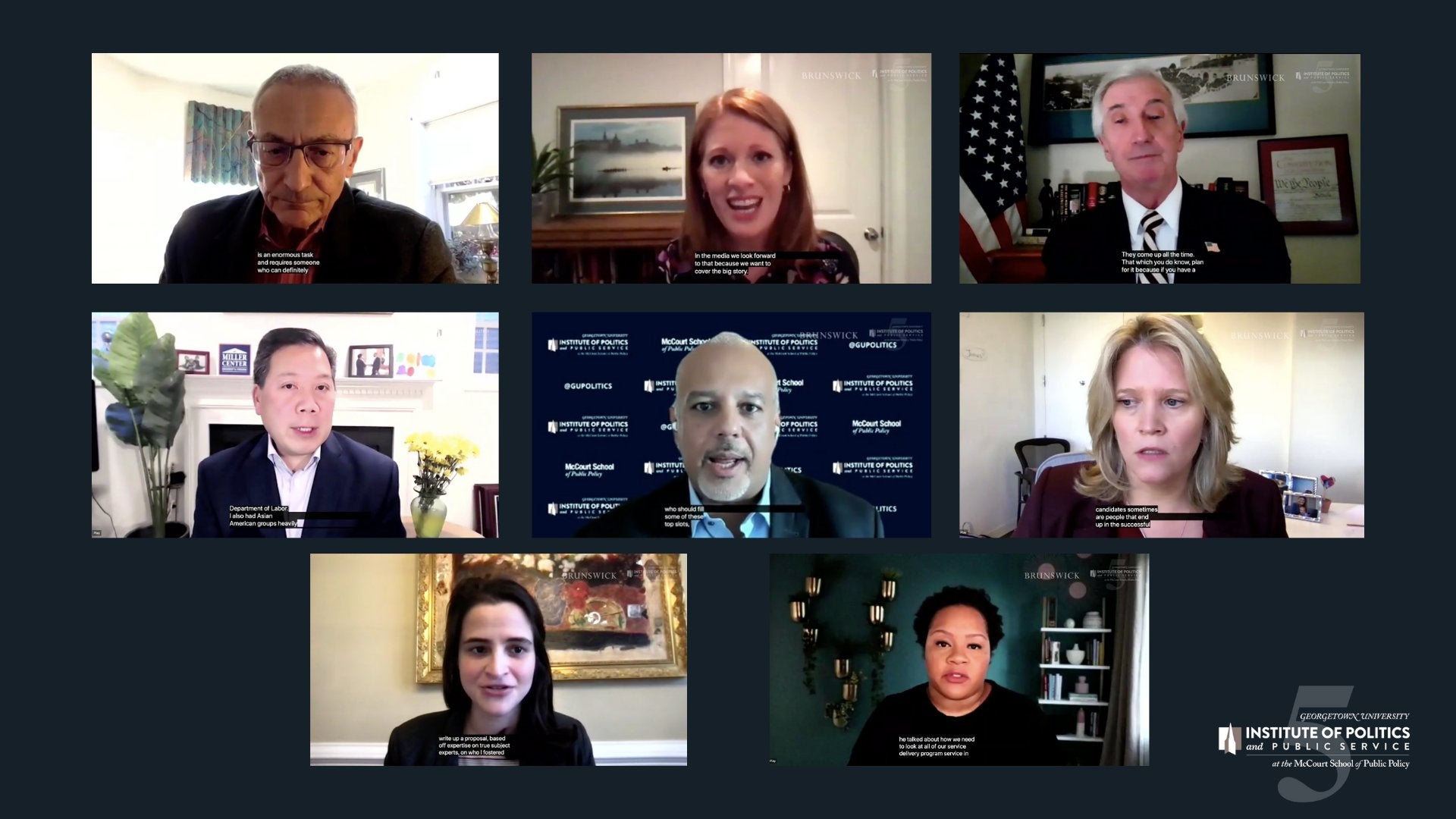Presidential Transition 2020
Experts, practitioners, and journalists share insight on the transition process and what to expect as President-Elect Joe Biden and Vice President-Elect Kamala Harris prepare to take office.
The presidential transition is underway as President-Elect Joe Biden and Vice President-Elect Kamala Harris prepare to take office next month. At a GU Politics event, experts, practitioners, and journalists discussed the transition process. The all-day event, presented by Brunswick Group, offered insight on what it takes to build a new administration , the confirmation process , and setting a new policy agenda .
Building a New Administration
With over 4,000 positions to be filled on a very short timeline and about 1,200 of them requiring Senate confirmation, ABC White House correspondent Karen Travers (C’00, G’03), asked former White House chiefs of staff –– Andy Card (President George W. Bush) and John Podesta (L’76) (President Bill Clinton) what they would prioritize as a starting point.
“What you have to focus on is staffing the White House first,” said Card. Podesta, who was co-chairman of the Obama-Biden Transition Project, agreed.
Podesta added that it is important to “pick someone who is a strategist to be your chief of staff.” He went on to describe how important it is that the chief of staff is able to pull the team together and develop the strategies to accomplish what the president campaigned on.
The Confirmation Process
The executive director of the Obama-Biden Transition Project, Chris Lu, and Sara Fagen, the White House political director during the George W. Bush administration, shed light on the confirmation process.
“This is not easy,” said Lu, who described the process as putting together a puzzle. “Every piece of the puzzle affects every other piece of the puzzle.”
In terms of vetting, Fagen outlined three components –– financial disclosures, character, and press review –– which are taken into account during the process. Mo Elleithee (SFS’94), moderator and executive director of GU Politics, added that there also seems to be a fourth component that is often discussed in confirmations––partisan history.
“We are going to see a lot closer votes on these nominees because of the polarization that we are experiencing in the country,” predicted Fagen.
Lu and Fagen listed off a few steps they see as important for a nominee to do in preparation for a Senate confirmation process including studying the position and agency, preparing for any anticipated attacks or tough questions, and finding the right balance between leaning into the president-elect’s policy priorities without getting too specific and closing off any future opportunities to work with others.
Setting A New Agenda
In terms of setting a new policy agenda, Stef Feldman, the national policy director of the Biden for President campaign, joined White House correspondent for PBS NewsHour Yamiche Alcindor (C’09) to describe what priorities look like for the incoming Biden administration.
Feldman began the conversation detailing the amount of time the policy team spent working with subject matter experts and then iterating on the best way to talk about the policies so that the American people know the impact it will have in their day-to-day lives. Feldman describes this as a standard practice noting that President-elect Biden prioritizes subject-matter expertise as well as effectively communicating policies and delivering results.
Describing how the campaign’s policy commitments aim to address the inequities and challenges that have existed for decades in the United States, Feldman said the policies are meant to “build back better” –– a frequently used Biden campaign slogan.
Feldman noted that President-Elect Biden is keenly aware that he is taking office in the midst of what he has described as several ongoing crises–– an economic crisis, a public health crisis, a climate crisis, and the crisis of systemic racism.
“There is a historic amount that he has to accomplish in his first 100 days,” Feldman said. “First and foremost, his goal is going to be to get this virus under control, get relief to working families and small businesses, and then to work to build back our economy better and more inclusive than ever.”
- Tagged
- GU Politics
